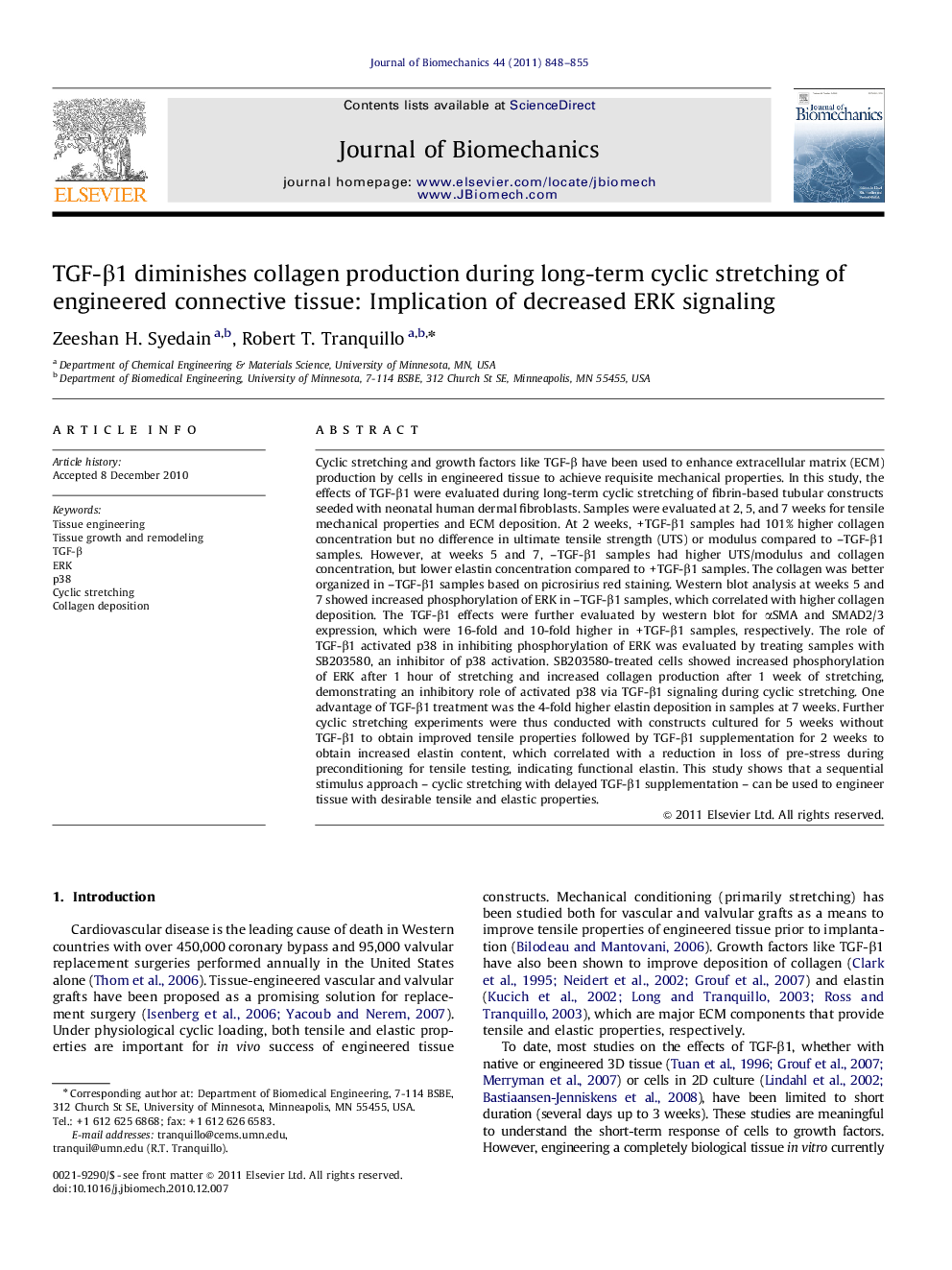| کد مقاله | کد نشریه | سال انتشار | مقاله انگلیسی | نسخه تمام متن |
|---|---|---|---|---|
| 10432839 | 910261 | 2011 | 8 صفحه PDF | دانلود رایگان |
عنوان انگلیسی مقاله ISI
TGF-β1 diminishes collagen production during long-term cyclic stretching of engineered connective tissue: Implication of decreased ERK signaling
دانلود مقاله + سفارش ترجمه
دانلود مقاله ISI انگلیسی
رایگان برای ایرانیان
کلمات کلیدی
موضوعات مرتبط
مهندسی و علوم پایه
سایر رشته های مهندسی
مهندسی پزشکی
پیش نمایش صفحه اول مقاله

چکیده انگلیسی
Cyclic stretching and growth factors like TGF-β have been used to enhance extracellular matrix (ECM) production by cells in engineered tissue to achieve requisite mechanical properties. In this study, the effects of TGF-β1 were evaluated during long-term cyclic stretching of fibrin-based tubular constructs seeded with neonatal human dermal fibroblasts. Samples were evaluated at 2, 5, and 7 weeks for tensile mechanical properties and ECM deposition. At 2 weeks, +TGF-β1 samples had 101% higher collagen concentration but no difference in ultimate tensile strength (UTS) or modulus compared to -TGF-β1 samples. However, at weeks 5 and 7, -TGF-β1 samples had higher UTS/modulus and collagen concentration, but lower elastin concentration compared to +TGF-β1 samples. The collagen was better organized in -TGF-β1 samples based on picrosirius red staining. Western blot analysis at weeks 5 and 7 showed increased phosphorylation of ERK in -TGF-β1 samples, which correlated with higher collagen deposition. The TGF-β1 effects were further evaluated by western blot for αSMA and SMAD2/3 expression, which were 16-fold and 10-fold higher in +TGF-β1 samples, respectively. The role of TGF-β1 activated p38 in inhibiting phosphorylation of ERK was evaluated by treating samples with SB203580, an inhibitor of p38 activation. SB203580-treated cells showed increased phosphorylation of ERK after 1 hour of stretching and increased collagen production after 1 week of stretching, demonstrating an inhibitory role of activated p38 via TGF-β1 signaling during cyclic stretching. One advantage of TGF-β1 treatment was the 4-fold higher elastin deposition in samples at 7 weeks. Further cyclic stretching experiments were thus conducted with constructs cultured for 5 weeks without TGF-β1 to obtain improved tensile properties followed by TGF-β1 supplementation for 2 weeks to obtain increased elastin content, which correlated with a reduction in loss of pre-stress during preconditioning for tensile testing, indicating functional elastin. This study shows that a sequential stimulus approach - cyclic stretching with delayed TGF-β1 supplementation - can be used to engineer tissue with desirable tensile and elastic properties.
ناشر
Database: Elsevier - ScienceDirect (ساینس دایرکت)
Journal: Journal of Biomechanics - Volume 44, Issue 5, 15 March 2011, Pages 848-855
Journal: Journal of Biomechanics - Volume 44, Issue 5, 15 March 2011, Pages 848-855
نویسندگان
Zeeshan H. Syedain, Robert T. Tranquillo,